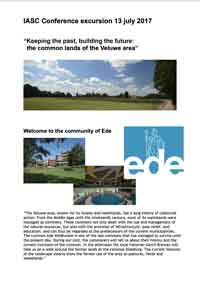Nowadays there is a renewed interest in commons among citizens. A booming number of new citizens’ collectivities in a wide variety of sectors are set up around the world. Initiatives ranging from sustainable energy to care, infrastructure, and nature conservation: citizens are building new institutions through self-governance and cooperation.
Along with this booming number of commons, the scientific attention on the development of commons is growing rapidly. A global platform where citizen initiatives and scholars come together seems more important than ever, therefore, with great pleasure Utrecht University presents the largest conference on Commons, ‘the XVI Biennial IASC-Conference’ (July 10-14 , 2017).
Leading up to the conference we would like to give you a bit of a foretaste on some of the finest speakers at this conference. Today we introduce you
Dalton Erick Baltazar – Another inconvenient truth: We waste our wastes
A city of nearly half a million people, in the Philippines, wastes USD 1.5 million a year by failing to manage recyclable waste, a major research project has found. And the good news is that the poorest people in the city are likely to get involved in recycling more material, in response to education campaigns, the researchers found.
Calamba City, in the Philippines – the country’s hot springs “resort capital” some 50 kilometers south of Manila – was the topic of study by the Sustainable Waste Management Network (SWAN) Project. The project is a joint effort of the University of the Philippines Los Baños and Osaka University and Ritsumeikan University in Japan. Calamba City pays USD 2.3 million annually to a contractor to collect and dispose of mixed household wastes. The research findings reveal that around 49 percent of the 40,000 tons of recyclables produced by households every year go unmanaged (dumped somewhere, burned, or buried). If those items were recycled instead, the city would see a savings of USD 1.5 million annually, which it could spend for other environmental and livelihood projects.
The research shows that the average household in the city holds about 3 kilograms of wastes any day, 50 percent of which are recyclables. The type of waste varies: Poor households (earning less than USD 36 monthly) generate mostly biodegradables and soft plastics that are hard to recycle, while low- and middle-income households generate more hard-plastic wastes that are easier to recycle.
Poor households generate more wastes than low- and middle-income ones. And project results suggest that poor households tend to recycle more than low- and middle-income households even if all of them have equal awareness of waste and recycling issues. Poor households are, in fact, more willing to contribute time for a better waste management system. This may be so because these poor households are “less busy” and are more open to information and education campaign officers of the city.
These results clearly establish the importance of information dissemination in changing the attitude of households toward waste management. The SWAN Project ultimately aims to build a network of local government units, practitioners, researchers, and other communities that would help raise awareness and improve solid waste management practices.
For more information, attend the presentation in Utrecht on Wednesday July 12, 2017, 11:00 to 12:30, at Academiegebouw, Zaal 1636 (ground floor) or contact Dalton Erick Baltazar (dalton.baltazar.64a@kyoto-u.jp).
About the XVI Biennial IASC-Conference
At the XVI Biennial IASC-Conference ´Practicing the commons´ (10- 14 July) you will find various ways to engage in societal and academic debates on commons. The intention of this conference is to not only facilitate the exchange of scholarship between researchers working on commons (working and living across the globe), but also to bring to the fore the interaction with practitioners of commons, hence the title of the conference ‘Practicing the commons’.
The conference has an international character with over 700 registered participants representing over 65 countries. The keynote speakers are prof. dr. Saskia Sassen, prof. dr. Jane Humphries, and prof. dr. Juan Camilo Cárdenas. The event hosts various workshops, over 120 academic sessions, 14 practitioners’ labs, 4 round tables and 3 clinics.
Read more about the conference

